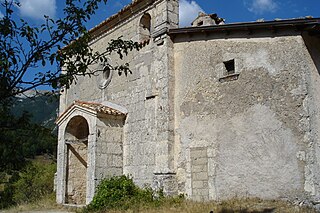
Abruzzo, historically known as Abruzzi, is a region of Southern Italy with an area of 10,763 square km and a population of 1.3 million. It is divided into four provinces: L'Aquila, Teramo, Pescara, and Chieti. Its western border lies 80 km (50 mi) east of Rome. Abruzzo borders the region of Marche to the north, Lazio to the west and north-west, Molise to the south and the Adriatic Sea to the east. Geographically, Abruzzo is divided into a mountainous area in the west, which includes the highest massifs of the Apennines, such as the Gran Sasso d'Italia and the Maiella, and a coastal area in the east with beaches on the Adriatic Sea.

The province of L'Aquila is the largest, most mountainous and least densely populated province of the Abruzzo region of Italy. It comprises about half the landmass of Abruzzo and occupies the western part of the region. It has borders with the provinces of Teramo to the north, Pescara and Chieti to the east, Isernia to the south and Frosinone, Rome and Rieti to the west. Its capital is the city of L'Aquila.

Penne is an Italian town in the province of Pescara, in the Abruzzo region, in mid-southern Italy. According to the last census in 2014 the population was 12,451. It is one of I Borghi più belli d'Italia.
Palena is a comune and town in the province of Chieti in the Abruzzo region of Italy.

Torricella Peligna is a comune and town in the Province of Chieti in the Abruzzo region of Italy.

Tourism in Abruzzo has become one of the most prosperous sectors in the economy of Abruzzo, and in recent years has seen a remarkable growth attracting numerous tourists from Italy and Europe. According to statistics, in 2021 arrivals totaled 1,330,887. A total of 5,197,765 arrivals were tourists, a figure that puts the region seventeenth among the Italian regions for numbers of tourists per year. A moderate support to tourism is also given to the Abruzzo Airport with many low cost and charter flights connecting the entire region with the rest of Europe.
Oreste Recchione was an Italian painter, mainly of landscapes but also of religious and mythologic paintings.

The Abbey of the Holy Spirit at Morrone, known by various titles, is a former monastery some five kilometers outside of the town of Sulmona, at the base of Monte Morrone, in the Province of L'Aquila, region of Abruzzo, Italy.

The Hermitage of San Venanzio is the site the ancient hermitage of Saint Venantius of Camerino, located above a stream in a remote ravine within a few kilometers north of Raiano, Province of L'Aquila in the Abruzzo, Italy.

Eremo di Sant'Antonio is an hermitage located in Pescocostanzo, Province of L'Aquila.

Eremo di Sant'Angelo is an hermitage located in Lettomanoppello, Province of Pescara.

Eremo di San Bartolomeo in Legio is an hermitage located in Roccamorice, Province of Pescara, in the Abruzzo region of Italy.

Eremo di San Domenico is an hermitage located in Villalago, Province of L'Aquila.

Eremo di Sant'Egidio is an hermitage located in Scanno, Province of L'Aquila. It is located on the hill of the same name and dedicated to the Sant'Egidio.

Eremo di Sant'Angelo is an hermitage located in Palombaro, Province of Chieti.

Eremo della Madonna di Coccia is an hermitage located in Campo di Giove, Province of L'Aquila.

Eremo di Santa Maria del Cauto is an hermitage located in Morino, Province of L'Aquila.

Eremo di Santo Spirito a Majella is an hermitage located in Roccamorice, Province of Pescara.

Eremo di Sant'Onofrio al Morrone is an hermitage located in Sulmona, Province of L'Aquila ., dating back to the thirteenth century. A monk by the name of Pietro Angelerio living at this hermitage later became Pope Celestine V. The hermitage is located at an altitude of 620 meters, and can only be reached via a steep path from the village of Badia, on the eastern edge of the Valle Peligna.

Mount Porrara is a mountain in the Abruzzi Apennines, located between the lower province of L'Aquila and the province of Chieti, a natural geomorphological continuation south of the Maiella, included in the Maiella National Park.


















